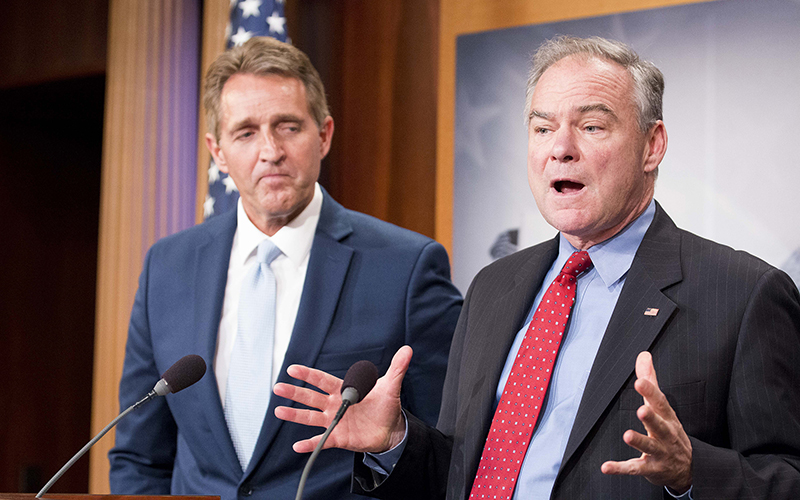
Sen. Jeff Flake, R-Arizona, left, said the bill by him and Sen. Tim Kaine, D-Virginia, was needed because threats to the U.S. have changed since the last authorization for use of military force, shortly after 9/11. (Photo by Ben Moffat/Cronkite News)

Sen. Jeff Flake, R-Arizona, watches as Sen. Tim Kaine, D-Virginia, speaks about their bill to authorize use of military force against non-state terror groups, like ISIS, al Qaeda and the Taliban, among others. (Photo by Ben Moffat/Cronkite News)
WASHINGTON – Arizona Sen. Jeff Flake and Virginia Sen. Tim Kaine introduced a use-of-force resolution Thursday that would let the president take military action against “non-state actors” like al Qaeda, ISIS and other terror groups.
The last time Congress voted for an authorization for use of military force – or AUMF – was shortly after the 9/11 attacks, and they let the president act against nations and organizations that carried out, planned or aided in those attacks.
But Flake, a Republican, and Kaine, a Democrat, said sovereign states are no longer as much of a threat as terror groups like ISIS, al Qaeda and the Taliban.
“Rarely do we now declare war against sovereign state,” Flake said. “We’re dealing with non-state actors – non-state actors that move and morph.”
Kaine agreed that the landscape has changed since the current military authorizations were passed.
“We need to think about the last 16 years and operating both under the 2001 authorization and under the 2002 authorization,” Kaine said. “And if we can’t learn from that, then we’re doing something wrong.”
Their bill would not cover state actors like North Korea, and it does not provide authorization for offensive or deterrent measures. It would not have applied to President Donald Trump’s April 6 order to launch a cruise missile strike against targets in Syria after reports that President Bashar Assad used chemical weapons against his own people in the ongoing civil war there.
Trump’s action was welcomed at the time by most on Capitol Hill – who were also caught by surprise by the order, and who cautioned that the president should come to Congress in the future for any escalation of that involvement.
-Cronkite News video by Noelle Lilley
Flake and Kaine said that was one reason for their AUMF resolution, which becomes the latest of several currently pending in the House and Senate.
“From the days of President (Thomas) Jefferson dealing with the Barbary Coast pirates, there’s been an understanding that if you want to go on offense – if it’s not defense against an imminent threat, you need to go on offense – you need to get congressional approval,” Kaine said.
Their bill would replace the 2001 and the 2002 use-of-force resolutions with one allowing for strikes against “non-state actors.” The senators introduced a similar bill in 2015 that did not pass, but had higher hopes for their bipartisan effort this time, and high praise for each other.
“Working with him has been wonderful,” Flake said of Kaine. “He has, obviously, great concern about this area, but also just a dogged drive to get something like this done, and also a keen intellect, and he is a major driving force behind the language here.”
Kaine had similar praise for his colleague.
“I’ve really found a kindred spirit on this important issue, that Congress should be vigorous about its Article I responsibilities,” Kaine said, referring to the section of the Constitution that deals with Congress’ ability to declare war.
The issue is personal for both senators. Flake referenced his brother, who he said has been deployed more than a dozen times since the Sept. 11 attacks, as well as Kaine’s son, who is a Marine.
“Our troops need to know that we’re behind them,” Flake said. “And when Congress doesn’t speak on this issue for over a decade, there’s an issue there.”